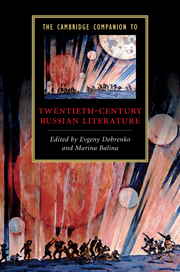Book contents
- Frontmatter
- 1 Poetry of the Silver Age
- 2 Prose between Symbolism and Realism
- 3 Poetry of the Revolution
- 4 Prose of the Revolution
- 5 Utopia and the Novel after the Revolution
- 6 Socialist Realism
- 7 Poetry after 1930
- 8 Russian Epic Novels of the Soviet Period
- 9 Prose after Stalin
- 10 Post-Soviet Literature between Realism and Postmodernism
- 11 Exile and Russian Literature
- 12 Drama and Theatre
- 13 Literature and Film
- 14 Literary Policies and Institutions
- 15 Russian Critical Theory
- Index
10 - Post-Soviet Literature between Realism and Postmodernism
Published online by Cambridge University Press: 28 May 2011
- Frontmatter
- 1 Poetry of the Silver Age
- 2 Prose between Symbolism and Realism
- 3 Poetry of the Revolution
- 4 Prose of the Revolution
- 5 Utopia and the Novel after the Revolution
- 6 Socialist Realism
- 7 Poetry after 1930
- 8 Russian Epic Novels of the Soviet Period
- 9 Prose after Stalin
- 10 Post-Soviet Literature between Realism and Postmodernism
- 11 Exile and Russian Literature
- 12 Drama and Theatre
- 13 Literature and Film
- 14 Literary Policies and Institutions
- 15 Russian Critical Theory
- Index
Summary
Perestroika in literature
The rapid revival of Russian literary life in the late 1980s and 1990s was a consequence of two significant events: the democratic reforms launched by Mikhail Gorbachev in 1987–1991, and especially the politics of glasnost´ (openness), which created the opportunity for public critique of Soviet ideology and politics; the latter process, after the collapse of the Communist regime in 1991, led to the complete elimination of censorship. One of the most striking signs of this perestroika in literature was the return of numerous previously banned literary works. In this avalanche of masterpieces, artistically complex works such as the novels of Andrei Platonov, Vladimir Nabokov, Sasha Sokolov, Venedikt Erofeev, the poetry of Joseph Brodsky, along with classical texts of Russian, European, and American modernism, as well as ´emigr´e and underground literature, now became available to readers. It is significant, however, that the most heated critical discussion was triggered not by these works, but by more conventional novels that dealt with political issues and offered an anti-totalitarian vision of the Soviet past; these latter received the greatest critical attention and generated the most excitement among the reading public.
- Type
- Chapter
- Information
- The Cambridge Companion to Twentieth-Century Russian Literature , pp. 175 - 194Publisher: Cambridge University PressPrint publication year: 2011
- 1
- Cited by



